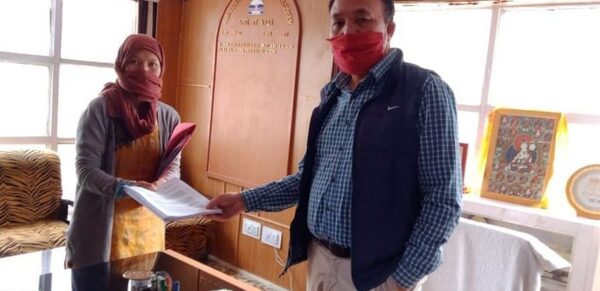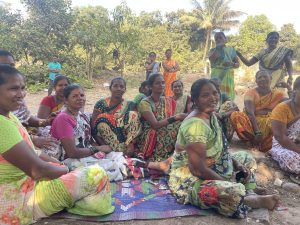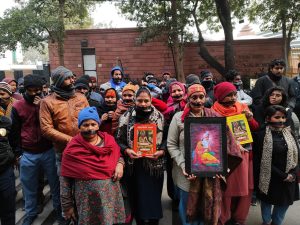Women Criminalised For Protecting Spiti Valley

For the past 6 months, Sonam Dolma (29) along with 15 women, has stood guard at the entrance gate everyday in Kaza town- the gateway to the Spiti valley- in the hill state of Himachal Pradesh (HP). The aim of the women of this small vulnerable hill region with a population of 12,445 ( as per 2011 census) to protect themselves from the risk of Covid-19 infection from outsiders. 72% of Spiti’s population is Scheduled Tribes.
These women, who are part of the Kaza Mahila Mandal (Kaza Women’s group), monitor every vehicle and person who comes into Kaza and ensure that they comply with the strict lockdown guidelines set by the locals, which includes a mandatory 15 day quarantine.
In early March, a local committee was formed in Spiti valley consisting of members of the local Buddhist Gompas (monasteries), the Vyapar Mandal (traders association) and Yuva Mandal (Youth Association) who decided to impose strict monitoring and quarantine guidelines. Spiti valley decided to impose a lockdown on 15 March, even before the rest of India was locked down on March 25 to contain the Covid pandemic. The women of the Kaza Mahila Mandal were roped in to help monitor the gates of Kaza and indeed the entire Spiti valley.
“Corona ko Bhagana hai. Spiti ko bachana hai” ( We have to defeat corona virus and save Spiti)”, has been our motto” Sonam Dolma, the leader of the Kaza Mahila Mandal told Behanbox over the telephone.
On June 9 2020, Ramlal Markanda, the agriculture minister of HP and the BJP Member of Legislative Assembly ( MLA) for Lahaul Spiti drove in to enter Kaza. He along with his entourage of 50 were stopped at the Kaza gate by the women and asked to follow the Spiti guidelines and quarantine themselves.
After the minister refused following an altercation with the women, he was forced to go back.
Soon after, First Information Reports (FIRs) were filed against 5 women, including Sonam Dolma, from the Mahila Mandal by the Kaza police under Sections 341 (wrongful restraint), 143 (unlawful assembly) and 188 (disobedience of public order) of the Indian Penal Code. They were charged for jamming the highway and obstructing government business.
The Spiti protection committee asked the women to apologise to the minister. The women refused.
On the contrary, infuriated at the charges against 5 of its members, the women sent names of all the 250 women of the Mahila Mandal to be included in the FIR.
Three months since, despite several petitions to the Governor and chief minister of Himachal Pradesh and assurances by them, the FIRs have not been withdrawn. Additionally, the police have refused to share a copy of the FIR with the women of the Mahila Mandal.
The women of Spiti organised themselves and raised their voices to protect their communities and they have been criminalised for it.
“ Normally the police file charges for taking a life. Here, they are filing a case against us for protecting lives”, Dolma told Behanbox.
Women’s Quest to Save Spiti Valley
Women of the Spiti valley have been at the forefront of protecting their communities since they first heard of the pandemic in early March. Spiti valley, with a total area of 7,100 sq kms is part of the district of Lahaul Spiti.
“Spiti is so small and interconnected that one case is enough to infect the entire valley. We don’t have the habit of distancing”, Sonam Dolma said. “ If the pandemic breaks out, we neither have the hospitals nor the money to get the treatment. Our only option is to check the infection at the gate”, she said.
Since 15 March 2020, women of Kaza have stood at the Kaza gate to monitor entry of people and vehicles from outside. Every person who enters Kaza is put under mandatory 15 days quarantine by the women of the Mahila Mandal. When a truck with essential supplies such as vegetables or food enters Kaza, women ensure that the driver stays inside the truck until the unloading is complete. The driver and the truck are then sent back from the gate.
But enforcing these norms strictly has not been easy for the women, especially with little help from the government administration. For starters, while they would have wanted to stand guard round the clock, the administration gave them permission only from 6 AM to 8 PM. Usually, people who disregard the rules, have tried to enter Kaza after women have left the gate. However, women of Kaza have told the local hotel owners to inform them when someone new enters, even if it is very late in the night, so they could hurry over and quarantine them. Women have sometimes gone after 11 PM to arrange for quarantine after they had been alerted, said Sonam.
While some follow the local guidelines, many government personnel refuse to do so.
“These days, we fold our hands and tell them to have mercy on us and quarantine themselves in guesthouses at least for a week, if not for 15 days, for the sake of our people”, said Dolma.
The fears of rapid spread of infection is heightened by the crumbling health infrastructure of Spiti valley. The nearest hospital is 25 kms away in Lahaul. The only speciality hospital is in Shimla, capital of the state.
“ We have to go to Shimla if we need an ultrasound or in case of a complicated delivery. How will they handle a disease like corona?” asks Dolma. “ We cannot bear to see our elderly and children dying like this”, she said.
Women of Spiti are angry and disappointed at the administrative apathy to their efforts. While they work hard to contain the pandemic, the government, they believe, is relaxing the rules instead of enforcing them and exposing Spiti to greater risk.
Despite the loss to their own livelihoods and incomes, women of Spiti have been enforcing these strict norms. Spiti largely relies on tourism for income, which has been severely hit by the pandemic.
“We have not earned at all this year. We have shut our hotels and homestays. We have not harvested our old crops. We are not able to think about money when we are fighting for our life here”, Dolma told BehanBox.
Criminalising Dissent in Spiti
The FIRs against the women of Kaza’s Mahila Mandal for refusing entry to the minister and his entourage follows a worrying pattern of criminalising dissenting voices of women. In recent times, women students at the forefront of the resistance against the amendments to the Citizenship Act to ASHA workers protesting for better pay and work conditions during the Covid-19 pandemic have been charged under various sections of the IPC.
In Spiti, even while an entire committee is working towards protecting Spiti valley, these criminal charges have been filed against the women of the Mahila Mandal only. Additionally, women have not been given a copy of the FIR.
“When we demand a copy which is our right, they say ‘ We have sent it, where it needs to go’”, said Dolma. The women do not have a lawyer to represent them.
A month after the charges were filed against them, the women sent the Yuva mandal members to meet with the chief minister Jairam Thakur with a petition to drop the charges. Despite his assurances, charges remain.
Criminalisation by the state and intimidation by the members of the local Bhartiya Janata Party unit and the Tribal Advisory Committee (TAC) notwithstanding, the women continue to do the job they set out to since the pandemic broke out- to stand guard over the Kaza gate.
“We already have an FIR against us. How many more can they slap against us?”, asks Dolma.
The Mahila Mandal members, however, would like the government to acknowledge that they are helping the administration in fighting the pandemic and not obstructing them.
“We are trying to aid the administration and instead they are probing us for our activities”, lamented Dolma.
The bright spot amidst the pandemic and trumped up charges, says Sonam Dolma, is the overwhelming support the women have received from the entire Spiti valley. The women have conducted a door to door signature campaign and collected 1207 signatures in protest against the FIRs. They are planning more protests if the police do not drop these charges.
‘Akhir Jan toh Jahan hai ( Afterall,life is most important)”, says Sonam.
We believe everyone deserves equal access to accurate news. Support from our readers enables us to keep our journalism open and free for everyone, all over the world.




